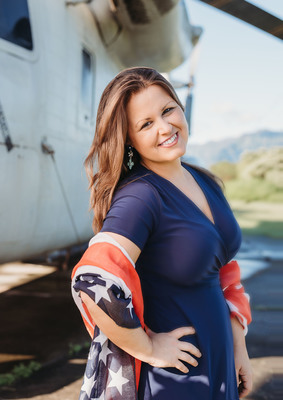Michelle Penczak
Branch: Marine Corps
Current Duty Station: Marine Corps Air Station Miramar
Number of Deployments: 5
Number of PCS's: 3
Share your military spouse story:
My husband and I met at a wedding in Virginia in 2012. Following our wedding in 2013, I was quickly tossed into the life of a pilot’s spouse. Through my military spouse ‘living the life’ education, I found some of my best friends.
While I was surrounded by wonderful people and mentors, I wanted to work. I applied everywhere. But no one said ‘yes’ to hiring me. Each time it was discovered that I was a military spouse, the tone of the interview would shift, and I wasn't hired.
After a lengthy search, I became a virtual assistant and was able to progress professionally until August 2015. At that time, I was laid off along with 400 others with no notice, 3 weeks into a deployment - and 3 months along with our first child.
I started my own company that day.
I worked until I gave birth to our first son, Sawyer, 6 months later in January 2016. I took a week off to adjust to being a family of three and then I was back to growing my company and identifying what would become my mission at Squared Away. And though I wish I had taken more time after Sawyer’s birth, my clients had no support and I was still able to love on my baby at home with me. It was challenging but it helped me grow!
Shortly after, we received orders to Hawaii. I was terrified!
My business was built on the east coast - would this work 6 time zones away? Time zones were NOT going to win.
I told my clients I was moving in October 2016 (took 1 week off) and then I resumed operations at 9:00 am EST/3:00 am HST. My new working hours became 3 - 11 am HST. The best part was - it worked. My clients didn’t leave and I didn’t break. I flourished!
In early 2017, one of my clients called me and said that I needed to scale because he and his associates needed more support. I told him I was in - if military spouses were the target assistant. Thus, Squared Away was born.
Today, I am the CEO and Co-founder of Squared Away and we employ over 240 assistants worldwide - 95% being military spouses.
Describe any leadership positions or provide an overview of your leadership contributions within the military community.
I have grown and scaled Squared Away from just me to 240 assistants in just over 4 years. The best part - about 230 of those are military spouses.
There was a lot of learning. I went to school for Political Science & History and got a ‘C’ in Economics to check the liberal arts box.
But what I’ve learned on my leadership journey thus far is to always lead with your gut. Be transparent, be honest, and always be curious first. At Squared Away, we are in the business of building a team of leaders, not followers. So empowering my team to say “I intend to” instead of asking for permission helps them try to solve a problem on their own first.
This type of intent-based leadership is unconventional but I’ve seen so many military spouse leaders come out of their shells and flourish using this technique over the past 4 years.
What programs or projects are you currently involved in that support the needs of military families?
I work with Hiring Our Heroes and Wounded Warrior Project on assisting warriors, spouses, and caretakers with revamping their resumes for employment.
Pre-pandemic, I was a volunteer for our unit’s Command Team and volunteered with the Semper Fi Fund.
What moments best reflect your impact on building inclusive community among military spouses?
I support my community by creating as much opportunity as possible for military spouses and by working to decrease the astounding military spouse unemployment rate.
I have seen firsthand that military spouses are some of the best assistants and partners that anyone can have – we’re adaptable, we are solutions-driven, and we are empathetic to all of life’s hardships.
By highlighting military spouses and their strengths, I am able to have a positive impact on my community and to change the lives of military spouses and their families; and it is easily the most fulfilling part of being CEO of Squared Away.
Identify your main advocacy effort and describe your personal connection to the cause.
I strongly and wholeheartedly advocate for more employment opportunities for military spouses. Everyone should have the opportunity to work regardless of the lifestyle or career of their spouse. Translating our experience as military spouses to civilians and shifting the narrative is what I advocate for daily.
Summarize your advocacy outreach strategies, including any events, media involvement, or other communication efforts.
Over the past few years, I have participated in numerous podcasts and interviews outlining the value of military spouses to employers.
I've been featured on media outlets such as CBS News, FORBES, NBC News, and Business Insider.
What do you hope to accomplish with the AFI Military Spouse of the Year®
title?
I hope to shift the narrative of how employers think about hiring military spouses AND how military spouses advocate for themselves for career positions they deserve.
